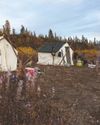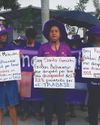
Rosalyn Roy was driving home from the Gulf News office, where she used to work as a local reporter, when she noticed a young girl alone and holding a handwritten protest sign, perched on the wall in front of the Channel-Port aux Basques town hall.
Roy immediately drove home to get her dog – “I find having a dog in a small town is an easy icebreaker; he’s three years old and looks like a puppy” – before heading back to the town hall. The lone protester turned out to be 14-year-old Emma Osmond, the only student in Channel-Port aux Basques, Newfoundland and Labrador, to participate in Canada’s countrywide student climate strike on May 3. (Thousands of Canadian kids walked out of schools across the country with Emma, and the global student strike on May 24 drew an estimated 1.4 million people across 118 countries.)
“She was shy at first,” Roy recalls, “but once we got into talking about something that clearly mattered to her, she opened up and shared.”
The next day, Roy – who was born in Channel-Port aux Basques and whose mother was named after the founder of the Gulf News – submitted her article about Emma and the climate strike for publication.
Emma may have been the only climate striker on May 3, but Channel-Port aux Basques, like many Maritime communities, has undoubtedly begun to feel the impact of the climate crisis. And when it comes to reporting on these climate issues, Roy believes her style of hyperlocal reporting is imperative: “You need to be boots on the ground.”
“Climate change is a particularly important issue in Newfoundland and Labrador because of our geography, social layout, and population distribution,” says Conor Curtis, an activist, writer, and resident of Corner Brook, a city on the west coast of Newfoundland. “And it deserves more attention than it gets.”
Bu hikaye Briarpatch dergisinin September/October 2019 sayısından alınmıştır.
Start your 7-day Magzter GOLD free trial to access thousands of curated premium stories, and 9,000+ magazines and newspapers.
Already a subscriber ? Giriş Yap
Bu hikaye Briarpatch dergisinin September/October 2019 sayısından alınmıştır.
Start your 7-day Magzter GOLD free trial to access thousands of curated premium stories, and 9,000+ magazines and newspapers.
Already a subscriber? Giriş Yap

PLATFORMS FOR PEOPLE, NOT PROFIT
Digital platforms boast that they’ve “democratized” cultural production. But what would truly democratic platforms look like in Canada?

ORGANIZING THROUGH LOSS IN THE HEART OF OIL COUNTRY
The story of climate justice organizing in Alberta, at the heart of the tarsands, is the story of a group of young activists learning what it means to lose, and keep on fighting

GROWING THE LABOUR MOVEMENT
How unions are using community gardens to engage members, nourish communities, and help strikers weather the picket line

A NEW ERA FOR OLD CROW
In the Yukon’s northernmost community, the Vuntut Gwitchin First Nation is reckoning with how to preserve their land and culture, amid a warming climate and an influx of tourists

“At Least Hookers Get Wages”
The risky business of sex work in the gig economy

The Literal – And Literary – Futures We Build
Briarpatch editor Saima Desai talks to two judges of our Writing in the Margins contest about Idle No More and MMIWG, ethical kinship, writing queer sex, and their forthcoming work.

The Cost Of A T-Shirt
In Honduras, women maquila workers are fighting back against the multinational garment companies that they say are endangering their health and safety.

Milking Prison Labour
Canada’s prison farms are being reopened. But when prisoners will be paid pennies a day, and the fruits of their labour will likely be exported for profit, there’s little to celebrate.

Bringing Back The Beat
In mainstream media, labour journalism has been replaced by financial reporting and business sections. But journalism students are raising the labour beat from the grave.

There's No Journalism On A Dead Planet
Corporate media owners are killing local newspapers – which is making it impossible for everyday people to understand the on-the-ground impacts of the climate crisis